Business, where the profit motive is explicitly dominant and where the hundreds of millions of direct and indirect owners want to see it remain the crowned ruler, might be expected to reject spending that syphons off profits to political causes… And yet, nearly every firm funnels funding to politically acceptable causes, in the main involving those of a social and environmental nature.
Sometimes, pressured by governmental regulatory stances, like the soon-to-be mandatory reductions on the top Australian emitters, a growing number of firms also engage in expenditure that replace fossil fuel derived energy with more expensive wind and solar. Also important is the avoidance by superannuation fund managers of investments in firms deemed to be involved in globally harmful activities within the ‘Environment, Social and Governance’ (ESG) framework. Once targeted at avoiding gambling, tobacco, and alcohol, the hallmark of these causes is now environmentalism, particularly avoiding fossil fuel producers.
Stocks favoured by sentiment will see their values rise in relation to their underlying earnings. But can this persist indefinitely without it being matched by increased profits?
Canstar and Chant West are among the organisations that monitor superfunds’ performances. About half of the funds scrutinised adopt the contemporary ESG doctrine that involves seeking to exclude firms producing fossil fuels from within their portfolios.
For many years, firms following this approach could offer credible claims that they were also performing well in terms of their overall returns. This is no longer the case. The following table draws from the superannuation fund monitors to show the ten worst fund performers in 2022, alongside the funds’ average performances over the past five years and their ESG status.
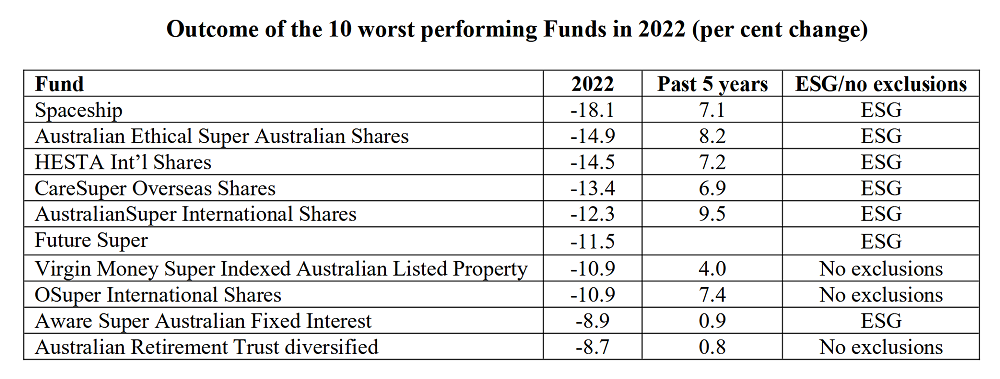 The six funds having performed worst are all ESG oriented, avoiding investments in firms mining coal and other hydrocarbons. This year they lost over 10 per cent of their members’ wealth. Those ESG funds that previously had strong performances were heavily invested in tech and property stocks, which had experienced above average gains. Tech stocks have now seen falling prices; this may also be true of property but most property funds have extensive holdings of un-listed investments (Virgin Money is one property fund that exclusively invests in listed property and showed an 11 per cent fall in value this year). Added to this is another factor: the recent buoyancy of the coal, gas, and oil stocks that the boycotting of which leaves ESG funds disadvantaged compared to funds that are more purely focused on returns.
The six funds having performed worst are all ESG oriented, avoiding investments in firms mining coal and other hydrocarbons. This year they lost over 10 per cent of their members’ wealth. Those ESG funds that previously had strong performances were heavily invested in tech and property stocks, which had experienced above average gains. Tech stocks have now seen falling prices; this may also be true of property but most property funds have extensive holdings of un-listed investments (Virgin Money is one property fund that exclusively invests in listed property and showed an 11 per cent fall in value this year). Added to this is another factor: the recent buoyancy of the coal, gas, and oil stocks that the boycotting of which leaves ESG funds disadvantaged compared to funds that are more purely focused on returns.
Most funds’ marketing material includes words that warn that past performance is not necessarily a guide to future performance, while extolling their past success. Thus Unisuper, which has divested from coal stocks, still has on its site that it led the Australian Prudential Regulation Authority (APRA) pack in terms of returns as at August 2021. But during 2022, Unisuper has lost 4.4 per cent of its members’ wealth. Similarly, with remarkable chutzpah, having this year lost 15 per cent of its members’ funds, Australian Ethical is running a TV promotional campaign featuring outlandish characters extolling the fund’s virtues, ‘Because I want my environment like I want my stocks – THRIVING!’
As a consumer protector, APRA has the power to force chronic under-performing funds to merge with a better-performing fund; four were forced to do so this year. However, now that the ESG funds have become demonstrably vulnerable to this sanction, industry bodies are calling for its dilution – even to prevent the under-performers being named, ‘If linked to deliberate strategies for climate change or other ESG issues.’ To buttress this protection of ESG under-performers, the Australian Council of Superannuation Investors is seeking to intensify ESG reporting requirements, the objective of which is to ensure few stand-outs. ESG reporting is already mandatory in the UK, EU, New Zealand, and Canada.
The share of wind and solar in global electricity supply has risen from zero at the turn of the 21st century to 10 per cent today (22 per cent in Australia with policies aiming at over 80 per cent). These are intrinsically high cost and low reliability energy sources. But private sector subsidy-seekers and institutional support on the back of the confected climate scare together with government subsidies have underpinned their growth. How will this be affected by newly evident financial realities in a competitive market for superannuants’ savings, where the savers’ prime concern is the returns they receive?
Got something to add? Join the discussion and comment below.
Get 10 issues for just $10
Subscribe to The Spectator Australia today for the next 10 magazine issues, plus full online access, for just $10.

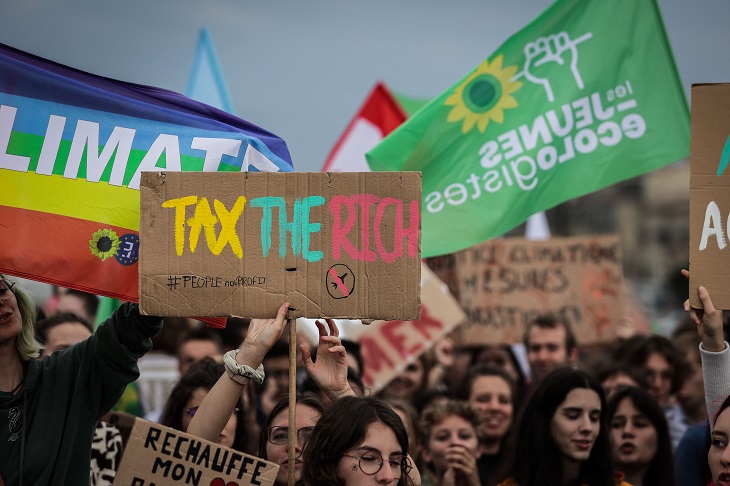
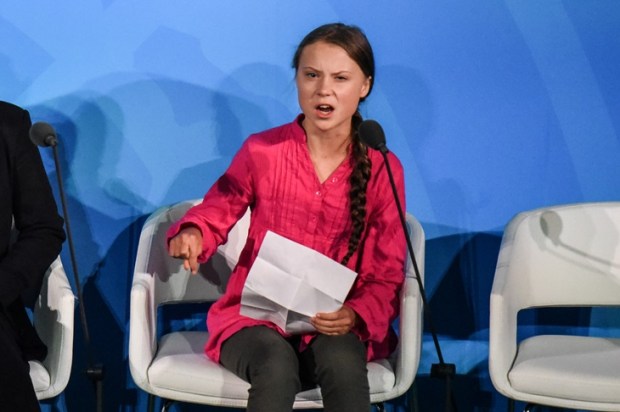
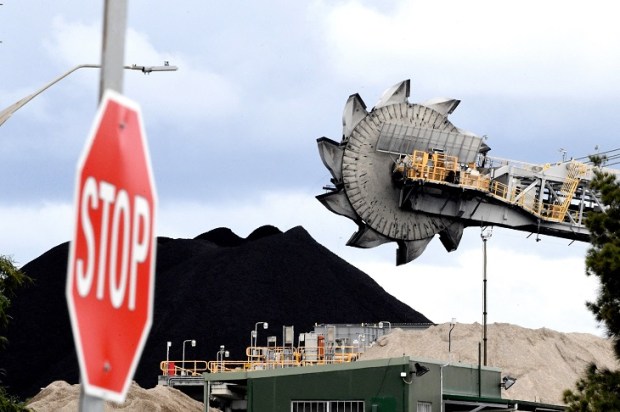

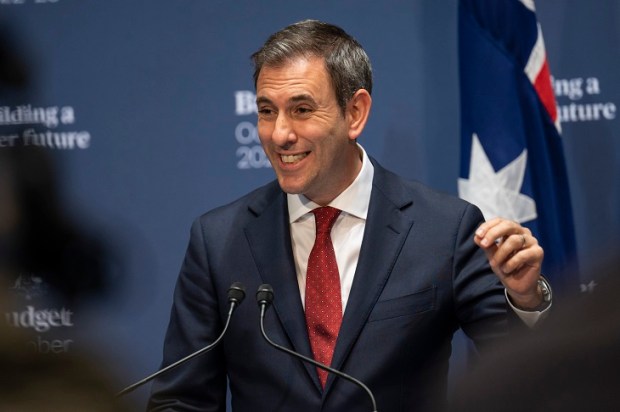




















Comments
Don't miss out
Join the conversation with other Spectator Australia readers. Subscribe to leave a comment.
SUBSCRIBEAlready a subscriber? Log in